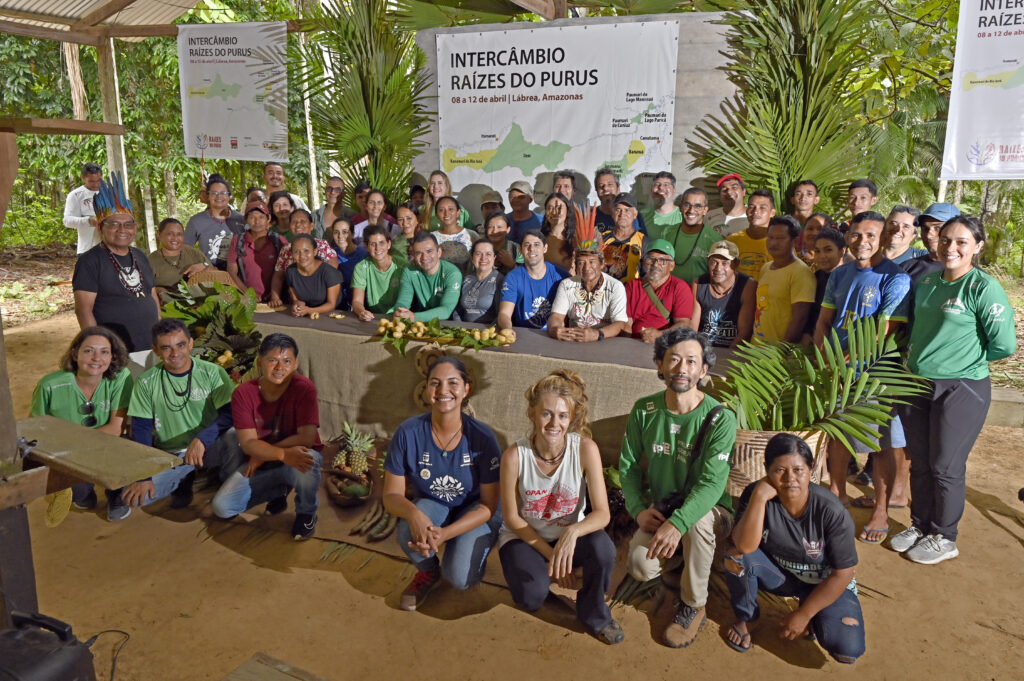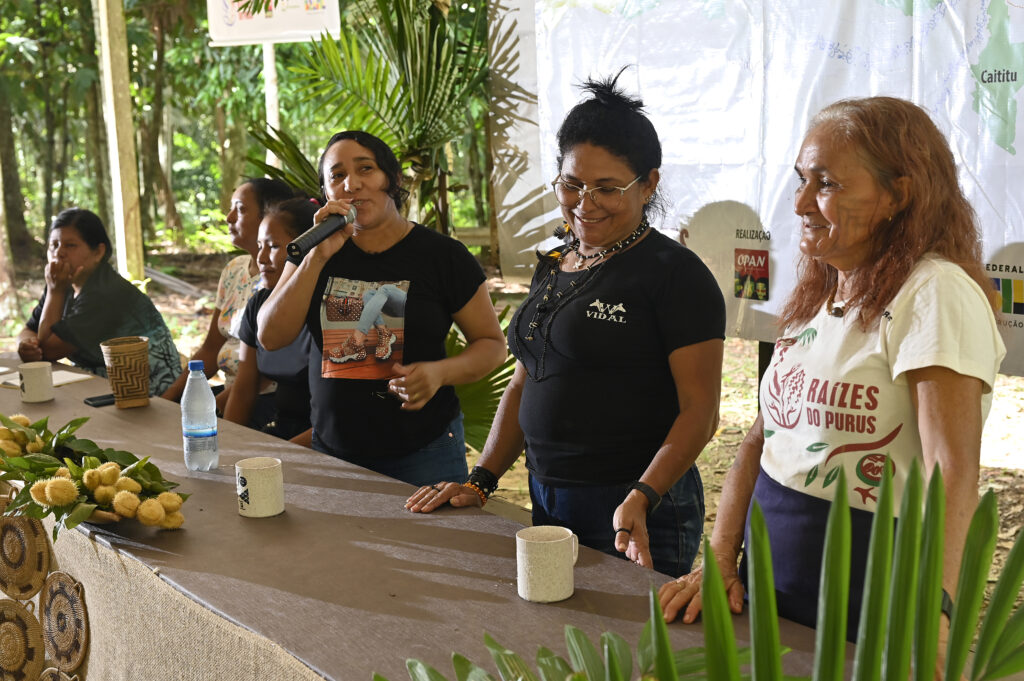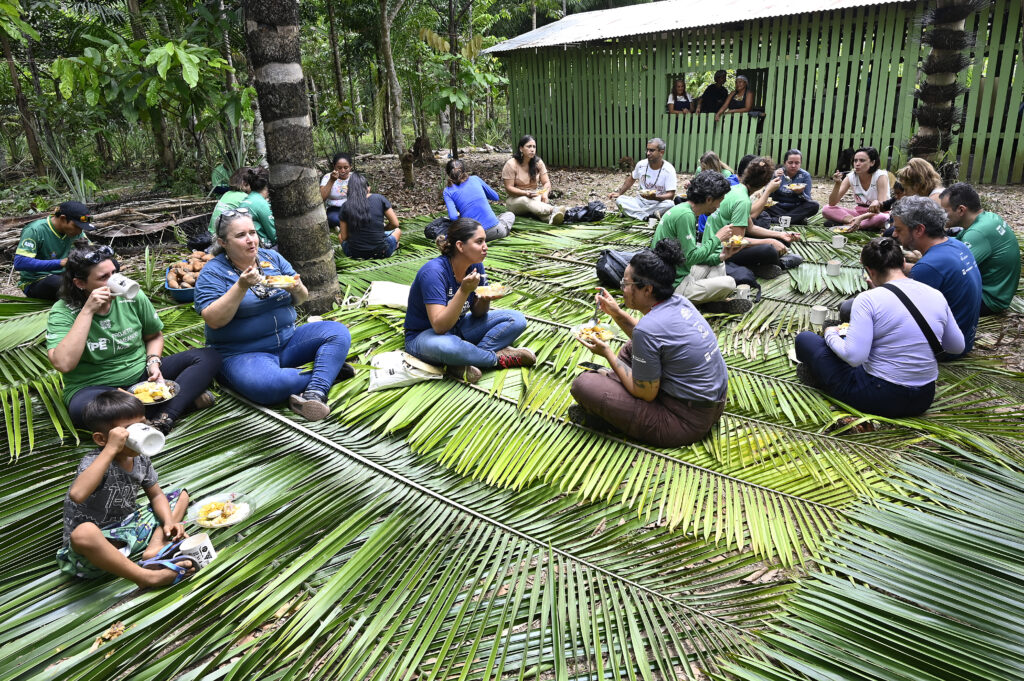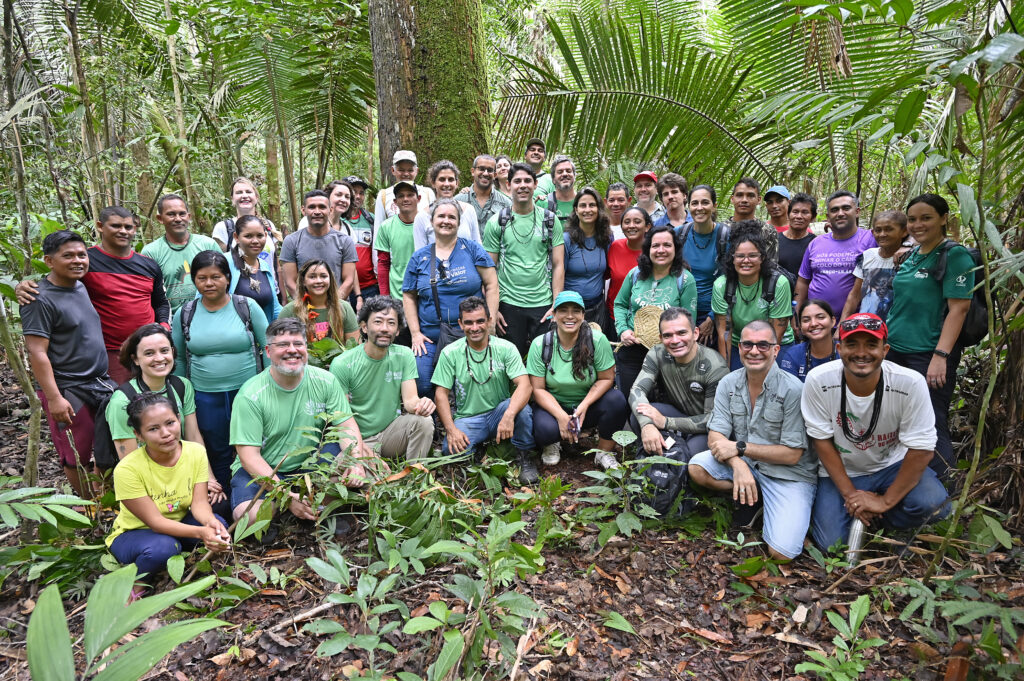Learning from the Apurinã and Paumari peoples
The event promoted the exchange of experiences between five socio-environmental projects and indigenous peoples of the south of Amazonas
By Talita Oliveira | OPAN
“We need to have our ears attentive to understand how to live in the Amazon and keep it the way indigenous peoples have done for at least 8,000 years”, suggests Felipe Rossoni, indigenist at Operação Amazônia Nativa (OPAN) and project coordinator Raízes do Purus. The speech was made at the opening of the exchange that brought together the indigenous peoples Apurinã and Paumari, representatives of five socio-environmental projects sponsored by the Socio-environmental Petrobras Program and part of the Petrobras Social Responsibility team.

The Caititu Indigenous Land, of the Apurinã people, in Lábrea (AM), was the headquarters of the event, bringing together the experiences of the projects In the climate of the Caatinga, Citizen Nursery, sowing water, value forests and Purus roots, the exchange host. The meeting was an opportunity to learn from the experience of Raízes do Purus, which has been supporting indigenous peoples in the territorial management of six indigenous lands in the south and southwest of Amazonas for more than 10 years. The five-day program involved conversations about sociobiodiversity, bioeconomy, fishing management, in addition to visits to agroforestry systems (FAS) and other production systems of the Apurinã people.
“The projects seek to generate transformations and legacies in the territory, and when we are present in the territory we have a vivid image of this transformation, this partnership between the projects and the communities, with Petrobras being part of this transforming gear”, evaluates Gregório Araújo, manager of environmental projects in the area of Petrobras Social Responsibility.
Indigenous women and sociobiodiversity
The work with the SAFs, with the medicinal beds, the management of the pirarucu, the handicrafts and the social organization were brought from the eyes of the indigenous women of the Apurinã and Paumari peoples in the first round of the exchange conversation.
The implementation of agroforestry systems in the Caititu indigenous land, of the Apurinã people, began in 2013, in the first edition of the Raízes do Purus project. Today there are already 37 SAF units, distributed in 21 villages in the territory, adding an area of 41.6 hectares that are in full production of fruits, beans, tubers and other foods.

“It is through the SAF that we can bring food and wealth to our table. The SAF strengthened our knowledge in planting and also on how to use our medicinal plants”, reported Maria dos Anjos, indigenous to the Apurinã people, known as the ‘Queen of SAFs’.
The Paumari people of the Tapauá River have been managing pirarucu for more than a decade and are a reference for other peoples for the excellence in the coordination of work and quality of fish. In addition to recovering the population of arapaima, generating income and strengthening territorial management, the activity also provided the occupation of spaces by women and equal remuneration among men and women.
“At the beginning of the management, the men worked alone and we saw them arrive tired. So we started to participate and from there we are getting stronger and stronger. We also began to rescue our culture of handicrafts”, recalled Kamelice Paumari, coordinator of the Thematic Coordination of the Work of Women of the Indigenous Association of the People of Waters (AIPA).
Traditional cuisine

One of the highlights of the exchange was the traditional cuisine offered by the women of the Apurinã people. Most of the food consumed at the event was planted and harvested by the Apurinã people in their agroforestry systems. Cassava, various vegetables, cupuaçu, açaí, bananas, genipap, babassu coconut, chestnut, tapioca, beach beans and santo grass were some of the ingredients consumed in meals.
“The cassava is the queen, we couldn’t have any kind of celebration without the cassava. We are eating a cassava that we are going to ‘break’ today, because it has been planted by Dona Tereza for nine months, one of the people who planted what we are eating today”, reported, moved, Renata Peixe-Boi, indigenous of the Mura people and cook responsible for coordinating the kitchen during the event.
Knowing the agroforestry and production systems of the Apurinã people
As part of the program, the participants were able to get to know the agroforestry cultivated by the Apurinã people. The visit included a walk in medicinal flower beds, agroforestry, açaiza and chestnut systems managed by the Apurinã people.

“It is an extractive chain that is important for these communities, but also for the maintenance of the forest standing, they are the guardians of the forest and that benefits all of us. While we have the forest standing, well maintained and well managed, we continue to have the offer of ecosystem services”, reflects Daniel Fernandes, general coordinator of the Caatinga Association, who participated in the exchange.
The program also included conversation circles about the açaí and Amazon nut production chains, carried out by the Apurinã people, and on the fishing management, led by the Paumari people. The group also visited the Amazon nut processing shed of the Indigenous Producers Association of the Caititu Indigenous Land (APITC).
